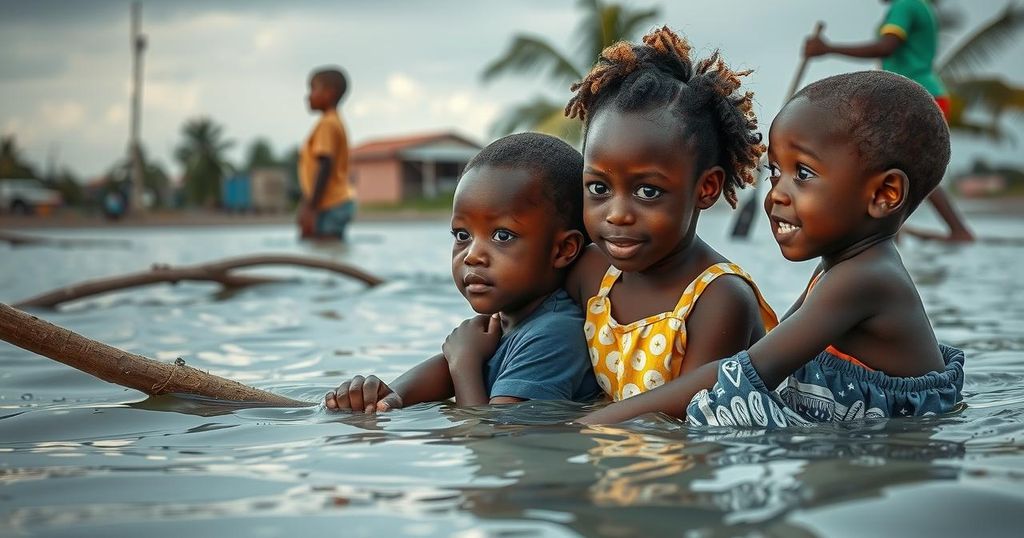Cyclone Chido has impacted around 90,000 children in Mozambique, destroying homes and classrooms, and displacing families. With at least 174,000 people affected, the situation is dire, exacerbated by ongoing conflicts and pre-existing emergencies in the region. UN agencies are mobilizing to provide urgent humanitarian assistance to those in need, although challenges persist.
Tropical Cyclone Chido has wreaked havoc in northern Mozambique, particularly affecting children in Cabo Delgado province. Reports from the United Nations Children’s Fund (UNICEF) indicate that approximately 90,000 children have been impacted by the storm, which struck over the weekend, resulting in devastating conditions. Current assessments reveal that nearly 35,000 homes have been destroyed, thousands of families have been displaced, and the overall impact extends to at least 174,000 individuals.
The cyclone has caused widespread destruction, with over 186,000 classrooms destroyed and 20 health facilities damaged, exacerbating the challenges faced by communities already affected by past emergencies. Cyclone Chido’s landfall near the city of Pemba led to extensive damage to infrastructure, leaving many without essential services.
Mary Louise Eagleton, the UNICEF Representative in Mozambique, highlighted the grave situation: “Mozambique is considered one of the most affected countries in the world by climate change and children were already experiencing several life-threatening emergencies before Cyclone Chido, including conflict, drought, and disease outbreaks.” In this context, UNICEF and its partners are mobilizing resources to provide emergency humanitarian assistance, despite significant logistical challenges.
The region of Cabo Delgado has been plagued by a prolonged conflict lasting seven years, resulting in over 1.3 million internally displaced individuals, predominantly women and children. The cyclone has further compounded their struggles by obliterating any progress made in rebuilding their lives. The storm also adversely affected surrounding provinces, including Nampula and Niassa, where significant infrastructure damage occurred, leaving many families without electricity and threatening ongoing cholera outbreaks.
In the immediate aftermath, UN agencies, including the UN Refugee Agency (UNHCR), began delivering emergency relief to affected populations, highlighting the urgent need for humanitarian assistance. UNHCR spokesperson Eujin Byun reported, “preliminary assessments suggest that around 190,000 people urgently need humanitarian assistance, 33 schools have been affected and nearly 10,000 homes were destroyed. In some villages, very few houses remain standing.”
UN Secretary-General António Guterres has assured that UN teams are in place to deliver emergency assistance and that the organization is prepared to provide further support as necessary. The Office for the Coordination of Humanitarian Affairs (OCHA) reported that limited supplies are hampering the response efforts. Nevertheless, Emergency Relief Coordinator Tom Fletcher has designated $4 million to aid Mozambique in this critical situation.
Furthermore, the World Food Programme (WFP) is set to enhance its support for nearly 3.3 million people expected to experience crisis-level food insecurity next year. The ramifications of Cyclone Chido extend beyond Mozambique, affecting areas such as Mayotte and southern Malawi, underscoring a widespread need for coordinated international assistance.
Cyclone Chido highlights the vulnerabilities faced by many communities in Mozambique, particularly children impacted by climate change-driven disasters, ongoing conflict, and public health crises. Mozambique is among the nations most adversely affected by climate phenomena, which compounds the existing challenges such as food insecurity and health emergencies. The ongoing conflicts in Cabo Delgado have displaced millions, making children particularly susceptible to the dire consequences of natural disasters. The cyclone’s recent impact serves to magnify these ongoing issues and emphasizes the urgent need for humanitarian interventions in the region.
In conclusion, Cyclone Chido has inflicted severe damage on northern Mozambique, displacing thousands and affecting approximately 90,000 children. With existing vulnerabilities heightened by the cyclone, including ruined infrastructure and ongoing health crises, the response from UNICEF and UN agencies is critical. The situation necessitates immediate humanitarian assistance and long-term recovery efforts to support affected populations and rebuild communities devastated by both conflict and disaster.
Original Source: news.un.org






